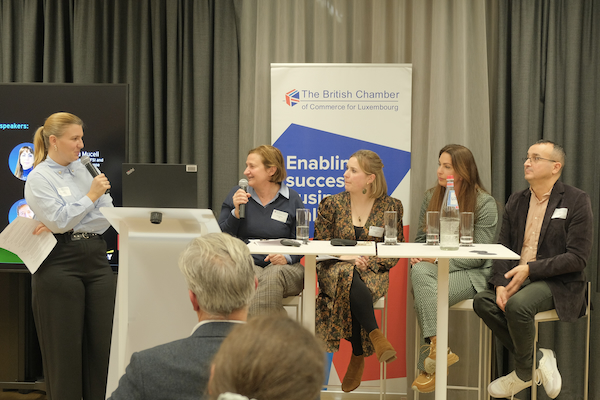 (L-R) Vanessa Müller, ESG Lead at EY Luxembourg; Laura Piovesan, Director General, Head of Projects Directorate at EIB; Sophia Cooper, Head of Training at ADEM; Irina Neagu-Muceli, AI Lead at Microsoft; Fateh Amroune, AI Factory Lead at Luxinnovation;
Credit: Steven Miller, Chronicle.lu
(L-R) Vanessa Müller, ESG Lead at EY Luxembourg; Laura Piovesan, Director General, Head of Projects Directorate at EIB; Sophia Cooper, Head of Training at ADEM; Irina Neagu-Muceli, AI Lead at Microsoft; Fateh Amroune, AI Factory Lead at Luxinnovation;
Credit: Steven Miller, Chronicle.lu
On the evening of Wednesday 12 November 2025, the British Chamber of Commerce for Luxembourg (BCC) hosted the event “AI as a force for planetary and societal good” at EY’s premises in Luxembourg-Kirchberg.
The event, which saw around 80 people in attendance, centred around the potential for artificial intelligence (AI) “to move our society and our planet towards a better world” and featured a panel discussion with contributions from Fateh Amroune, AI Factory Lead at Luxinnovation, Irina Neagu-Muceli, FSI & Health Cloud & AI Lead at Microsoft, Sophia Cooper, Head of Training at ADEM and Laura Piovesan, Director General, Head of Projects Directorate at EIB.
The panel discussion, moderated by Vanessa Müller, Partner and ESG Lead at EY Luxembourg, saw the contributors share their respective sector’s insights into how AI can contribute to sustainability strategy and targets, bring operational efficiency and mitigate risks, improve performance management and advance progress towards the United Nations Sustainable Development Goals.
On the subject of the main opportunities and challenges in using AI as a force for good in advancing sustainability, Laura Piovesan said: “For example, in agriculture AI-driven tools can help the farmers to use less water, to use less fertilisers, for example, or target better the use of fertilisers with a positive impact on climate, with a positive impact also on their productivity and being able to more dynamically also adapt to a very fast changing climate and weather.”
She added: “In cities, one can see multiple use cases and applications, for example, moving beyond smart buildings and the idea of buildings and urban infrastructure that we learn and develop with the communities, as an ecosystem. And this is something that AI can clearly enable. The smart mobility, we all have these use cases at hand, and this can really facilitate the way people access and use more public mobility services […] healthcare is also a very important use case in terms of making health more affordable, improving the way diagnostics are made, improving and developing faster new medicines, new medicine tools.”
Laura Piovesan then highlighted the main challenges of AI as environmental sustainability, the risk of digital division between those who have AI skills and access to the technology and those who do not, along with the importance of transparency and governance of AI systems.
Irina Neagu-Muceli then highlighted the work of Microsoft in its attempt to ensure sustainability is maintained in the face of fast-paced AI development and the notable increase in power usage by AI systems. She highlighted the research being undertaken in relation to improved cooling systems for AI and data storage centres, improved system latency through better material science and advancements in data storage methods, all of which can contribute to a reduction in both the Microsoft’s and its clients’ carbon footprints. She highlighted that Microsoft has set a target of being carbon neutral by 2030 and wants to remove all the CO2 it has generated since 1975 by 2050.
Sophia Cooper then spoke of the challenges for ADEM, employees and employers in relation to the “digital divide” being driven by gaps in “digital and AI literacy”. She said: “What [ADEM] would like to implement in the next years would definitely be to use more predictive models to extract skill requirements, do the gap analysis and then really focus on modular training pathways. […] In January we created a whole training programme for job seekers to be more ready and give them a better chance.“
On the subject of Luxembourg’s AI Factory, Fateh Amroune described how it is not just a hub for AI development but also acts as a “support company for AI adoption” with an approach designed to “push support for the entire ecosystem” and “develop solutions across the ecosystem” instead of just focusing on specific processes, institutions or businesses.
The panel discussion was then followed by a question and answer session involving members of the audience.
The event concluded with a networking session for attendees with food and refreshments provided by the hosts.








